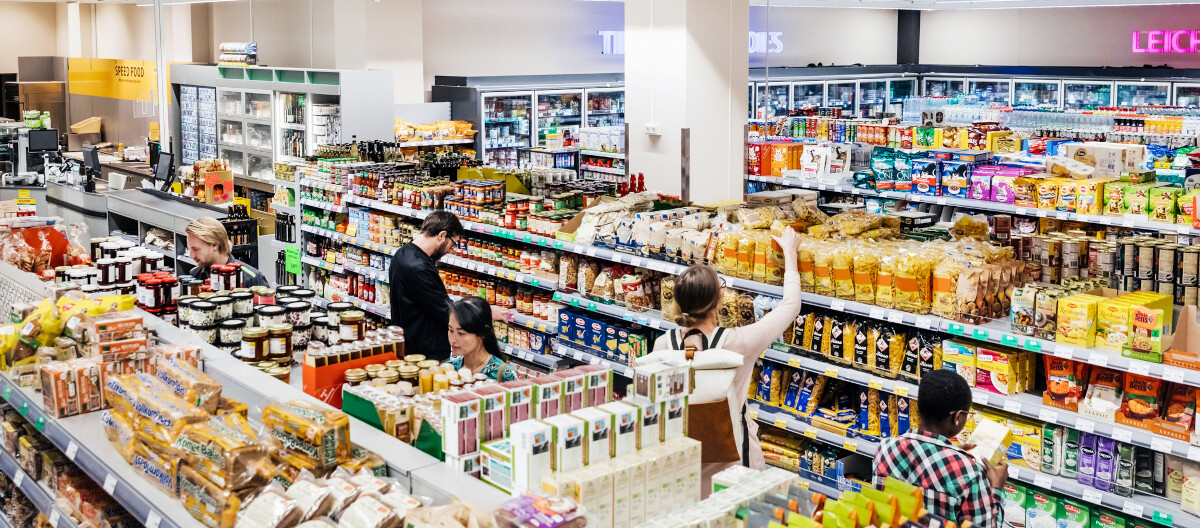Food inflation slows, but prices remain high
Although inflation has slowed, this doesn’t mean that prices are dropping – they are just rising more slowly. UK charity The Food Foundation reports that over the past two years the price of an average weekly food shop has increased by around 25%. This has a significant impact on low-income households. On top of that, nearly 90% of people in the UK think the cost of living crisis is ongoing.
Additionally, new post-Brexit charges on plant and animal imports introduced in April 2024 are likely to further push up food prices. From April 30, UK businesses must pay up to £145 per delivery of most animal products, plants or plant products imported from the EU through the Port of Dover and Eurotunnel. Importers must now pay £29 per type of product, up to a maximum of £145 for a single delivery containing several different products – meaning that a truck containing meat, yogurt and cheese could incur the highest charge.
Why the UK’s dependence on imported food poses a risk
Around half of the UK’s food is imported, mainly from the EU, with the Netherlands, France, Ireland and Germany as the biggest suppliers. In 2022, almost 40% of fresh vegetables came from the EU, according to government statistics. Only 16% of fruit is grown domestically, with 28% sourced from the EU and 56% from the rest of the world. This reliance on overseas produce was highlighted in 2023, when adverse weather conditions in Spain and North Africa caused shortages of items including tomatoes and cucumbers.
Dependence on imports increases food insecurity, hitting businesses and consumers hard. The Food Foundation reported that 44.2% of households reported buying fewer vegetables and 59.9% had cut back on purchasing fruit, meaning that low-income households struggle to maintain a healthy diet. The new import tariffs on food from the EU will only compound this, as importers will have no choice but to pass on costs to the consumer. Free trade deals with Australia and New Zealand offer some hope of tariff-free trade, but the benefits from these are yet to be felt.
Is ‘buying British’ a viable option?
According to World Bank data, the UK already uses about 70% of its land for agriculture, a higher proportion than most major EU countries. While there’s still potential to grow more produce domestically, the end of free movement from the EU has resulted in a shortage of casual labour. While seasonal worker visas were introduced as a temporary measure, this programme is set to expire at the end of 2024, leaving the future of British farming unclear.
A recent survey by the National Farmers’ Union revealed that 81% of respondents believe that being able to buy British food is ‘important’ or ‘very important’, with 94% saying support for farmers is ‘fairly’ or ‘very’ important. 75% of respondents also wanted the government to commit to sourcing at least half of all food for schools, prisons and hospitals from domestic farms. However, it’s worth bearing in mind that home-grown is not always cheaper: for example, British lamb prices have recently soared, leading some suppliers to source lamb from New Zealand.
Strategies for procurement
While many of the factors above are beyond the control of UK businesses, there are some strategies which can help mitigate the impact of high food prices. While these vary according to the individual business, here are a few starting points:
- Applying data-driven insights to monitor inventory levels, predict demand patterns and optimize supply chains by anticipating market trends
- Using efficient purchasing strategies and negotiations to obtain better prices and conditions from suppliers
- Streamlining inventory and implementing ‘just-in-time’ delivery to reduce inventory costs
- Bundling purchasing volumes to create an economy of scale and reduce purchase prices
- Using digital technologies to optimize procurement processes by making costs more transparent, simplifying decision-making and cooperation with business partners
- Constantly observing and tracking price developments to identify the most favourable times to take on either a long-term or short-term contract: this is especially important under the current circumstances in the UK, with a general election coming up.

